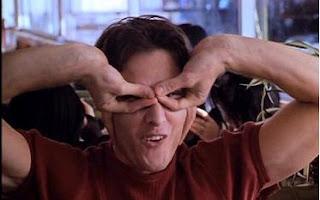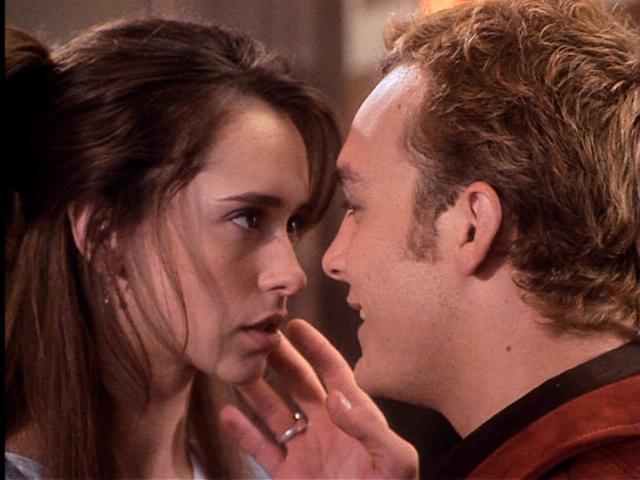It was Saturday night going on Sunday and the streets of Williamsburg were crackling with rain and laughter. I was in a fourth floor apartment by myself watching the second half of Can’t Hardly Wait on HBO. I recently turned 27 and this is how things are now [1].
For people of similar age, Can’t Hardly Wait was making the rounds on HBO/Showtime when we were just entering high school. I think there’s a cycle to these things so each group of 12-16 year olds gets access to a pseudo-guide before beginning/defining their own trajectory — and, later, this new group will become the old group and pass on their own pseudo-guide. Dazed and Confused. Fast Times. American Pie. Breakfast Club. As a youngster, you see these stories and characters as frameworks or almanacs. As veterans, you see them as splintered pieces of your experience.
In Can’t Hardly Wait, I of course identified with Preston (Ethan Embry) — an excellent iteration of the goodhearted, shy, idealistic main character in these things. Believing in Romance, big ‘R’, is pretty impossible to do out loud at any age, and rarely harder than when in high school. Wit, no matter how layered, often goes unnoticed by everyone but the wit-user themselves (Aman…duh!) and a quasi-supernatural belief in songs and Pop Tarts as real-life omens is a tough cross to bear even if you are attending a religiously-based high school. So when Preston affably showed his shyness, his reticence, his delusionary pursuit, and ultimate action… he sold it. I bought it. I found justifications or hope or whatever. I doubt I’m the only one [2]. He’s a great main character.
The thing is, on a plot level (I’m assuming you remember it and I am spoiling it here), if Amanda doesn’t show up at that train station at the end, Preston is still going to be fine. We know that because of his spiffy red coat, his Vonnegut workshop, and his smiling goodbye with Denise Fleming (…is a tampon). And we know because Preston, well, he actually tried [3] for what he wanted, and while he failed miserably it was for reasons largely out of his control. He still learned something and we, the audience, believe, as Preston does, that he’s learned and grown from the previous night.
When Amanda does come to the train station, but begins to walk away — Preston could still be fine leaving, too. What makes him a superb main character is that he acts on what we all know, demonstrates how he’s learned from his mistakes — he chases after her and defies fate’s ‘one chance’ (as proclaimed by the Angel from Will and Grace in Act 2).
I channeled Preston all of high school and most of my first year of college. I was not tough enough to be Mike Dexter, not nerdy enough to be William, nor confused enough to be Seth Green. But now at 27 and firmly out of education’s social clusters, I retrospectively identify with the whole lot. Because while high school movies are often themed upon the unfairness of labels, and the need for their dissolution (while simultaneously playing into them), the good high school movies are about identity, coming to terms with our own, and how that illusory word — identity — spills outside of the containers we’ve set aside for it.
And from more of a theatrical perspective, the thing is, everyone in Can’t Hardly Wait is confronted with change, and as the plot resolves itself, a certain reward and justice system is apparent [4]. For someone seeking parables from his fictional narratives, damn, that was a lot to think about at age 14 and it’s a lot to think about now.
In the interim 14 years since Can’t Hardly Wait‘s release, I have been (1) the egotistically-blinded and misguided Mike Dexter, (2) the goofy, peripheral watermelon obsessed Jason Segal (“Preston? He wears t-shirts… sometimes.”), (3) the identity-crisis-stricken Seth Green, (4) the regretful and confused burn out Jerry O’Connell/Trip McNeely, (5) the far-too-serious lead singer of Luvburger, or (6) even the memory-obsessed Melissa Joan Hart. These labels are cultivated on screen not because such purely stereotypical one dimensional characters exist, but because they’re the seeds in all of our psyches at various points in the years to come post-graduation… or something.
In high school and always it can seem impossible to wait for things — but if we continue to place any faith in our elders and their films and stories (as we have before and I think all still yearn to), then we believe in a warm and forgiving justice at work, and we believe as well in the chance for radically transformative life events [5] which could be waiting behind a Barry Manilow song, a stripper angel, a Pop Tart, a teen movie on HBO, and it’s up to us to take it from there.
Shakespeare once said basically we’re all actors in a 1990’s teen comedy and if we want to win the object of our desire (and our audience) we need to be open to that, we need to wait for it until the moment comes when we absolutely shouldn’t wait at all. That’s high school. That’s Romance. That’s it.
—
Footnotes:
[1] Writer’s block. New town. The ennui of whatever. Earlier in the week, I’d heard a 50 year old man on guitar sing about “desperately trying to hold on to what [he] believes,” and I have heard that line a hundred different ways but I always assumed it was about shielding beliefs from outside attack… until I aged and realized it’s a battle with your new self versus old just as much or more so.
[2] Trivia: Mark Hoppus wrote my favorite song on Enema of the State — “Going Away to College” — after seeing Can’t Hardly Wait.
[3] To fulfill any technophobic quotient or criteria I’ve created for myself, consider the impossibility of this movie’s plot if smartphones/social media are introduced, not even considering such devices’ identity scrambling properties, so please go ahead and try not to weep and feel old.
[4] In what might-but-not-for-sure be the first case of me using the phrase ‘exception that proves the rule’ correctly, note that in the movie Mike Dexter makes a noble sacrifice to William, the nerd, in the end, and seems redeemed, but the final scenes reveal he does not change at all, and the text epilogue seals his fate with this in mind.
[5] Writer-Director Deborah Kaplan’s movie prior to Can’t Hardly Wait was A Very Brady Sequel. Big step up, right?

